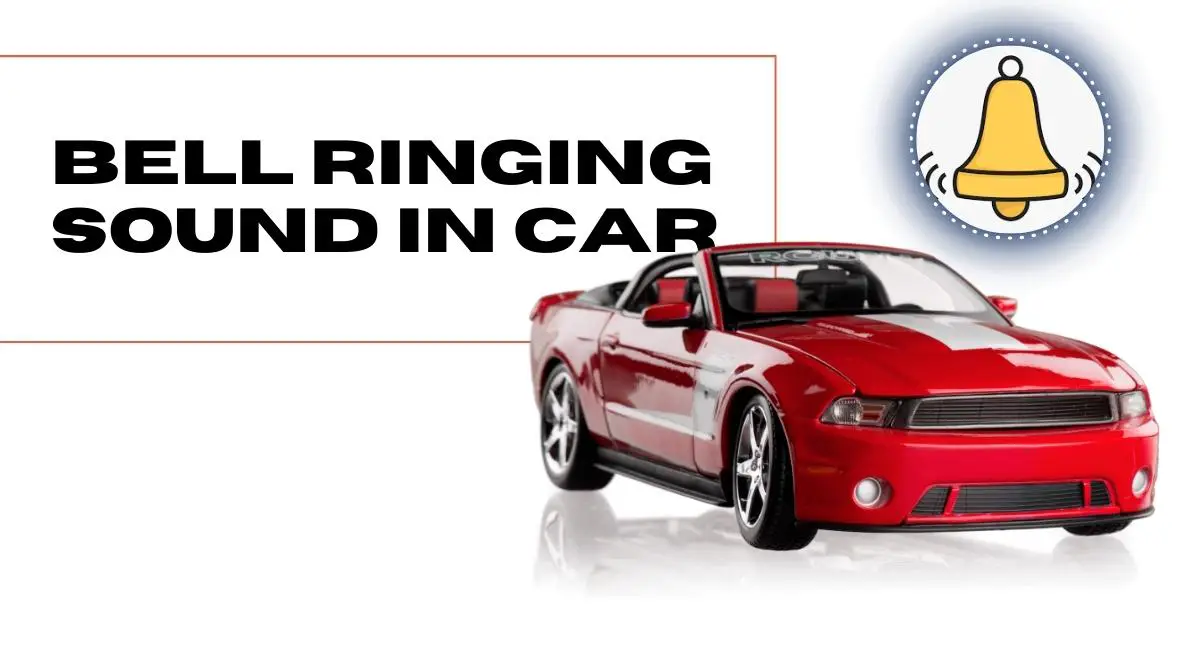Your car, a modern engineering marvel, is a complex symphony of moving parts and intricate systems. Each component has a specific function, working harmoniously to transport you from one destination to another. However, sometimes this symphony encounters a discordant note—a bell-ringing sound that seems to defy logic and disrupt the peace within your vehicle.
Understanding the source of this peculiar noise is crucial, not only for your peace of mind but also for the health and performance of your car. Several factors can contribute to the bell ringing sound in your vehicle.
So, why is my car ringing? This article handles the causes behind this intriguing sound and explores ways to address it. Understanding the source of the car ringing noise is crucial to ensure your car’s optimal performance and avoid potential issues.
Why Does My Car Sound Like a Bell Ringing
The bell ringing sound in a car is a distinct noise that is alarming for drivers and passengers. It often manifests as a high-pitched, metallic ringing noise that seems to come from under the hood or the vehicle’s underside.

The bell-ringing sound is typical in various scenarios, such as accelerating, decelerating, or even while the car is idling. It is essential to explore its possible causes to comprehend the bell-ringing sound.
One common culprit is engine knock, which refers to the improper detonation of the air-fuel mixture in the combustion chamber. This detonation produces a knocking or pinging sound that resembles a bell. Factors such as low-quality fuel with a low octane rating can contribute to engine knock.
Causes of the Bell Ringing Sound
The bell ringing sound in a car can have various underlying causes, each stemming from different components and systems within the vehicle. Let’s explore some of the common culprits behind the bell-ringing noise:
Engine-related Factors
A primary cause of the bell ringing sound is the engine knock. The engine knock occurs when the air-fuel mixture in the combustion chamber detonates improperly. It leads to a knocking or engine ringing sound, which can sometimes resemble a bell ringing. Factors contributing to engine knock include low-quality fuel with a low octane rating and engine misfires.
Exhaust System Issues
Problems within the exhaust system can also contribute to a ringing sound when driving. Exhaust leaks caused by deteriorated or damaged gaskets, pipes, or mufflers can create a distinct ringing sound. These leaks disrupt the flow of exhaust gases, resulting in abnormal noises.
A faulty catalytic converter can also generate unusual noises, including a ringing sound, as it struggles to perform its function effectively. Regular inspection and maintenance of the exhaust system—repairing or replacing damaged components, can help eliminate the bell-ringing noise caused by exhaust system issues.
Suspension and Braking Components
Worn-out suspension parts, such as bushings or shock absorbers, can cause ringing vibrations. Similarly, issues with the braking system, such as worn brake pads or warped rotors, can lead to abnormal noises, including ringing sounds, during braking maneuvers.
Other Possible Causes
Additional factors can contribute to the bell ringing sound in a car. Loose or damaged heat shields, typically found near the exhaust system, can create a rattling or ringing noise when they come into contact with other components.
Heat shields have a design that protects sensitive areas from excessive heat, and their proper installation and secure attachment are crucial.
Important Read: Why is Your Windshield Making Popping Noises?
Furthermore, various car parts subject to vibrations, such as engine mounts or exhaust hangers, can contribute to the overall ringing sound when driving. Ensuring these components are tight and in good condition can help reduce vibration-induced noises.
Diagnostic Procedures
If you’re experiencing a bell ringing in your car, it’s advisable to seek professional inspection. Automotive technicians have the expertise and tools to identify the source of the sound. They may examine the engine, exhaust system, suspension components, and braking system. But, following the following assessment procedures are helpful:
Initial Assessment
Start by observing and noting the specific conditions under which the bell ringing sound occurs. Pay attention to factors such as engine speed, vehicle speed, acceleration, deceleration, or braking. Note whether the sound is present at idle or during specific driving maneuvers. This initial assessment helps provide valuable information to the technician and aids in the diagnostic process.
Visual Inspection
Conduct a visual inspection of the engine bay, exhaust system, suspension components, and braking system. Look for any obvious signs of damage, loose parts, or leaks. Check for loose or damaged heat shields near the exhaust system, as they can contribute to the ringing sound. Additionally, inspect the condition of suspension components and brake pads for any visible wear or damage.
Diagnostic Tools
Automotive technicians utilize various diagnostic tools to assess the vehicle’s systems and components accurately. These tools may include an engine diagnostic scanner, which can read fault codes and provide insight into potential engine-related issues. Additionally, a chassis diagnostic tool can help identify suspension or braking system problems. These diagnostic tools enable technicians to gather data and pinpoint the source of the bell ringing sound more effectively.
System-Specific Checks
Depending on the initial assessment and visual inspection, technicians may conduct targeted checks on specific systems or components. It may involve measuring engine parameters, such as fuel pressure and ignition timing, to identify any issues contributing to engine knock. They may also inspect the exhaust system for leaks using smoke or pressure testing methods. Suspension components may be evaluated for wear or damage, and the braking system may undergo a thorough examination to identify any faults.
Addressing the Issue
Once the cause of the bell ringing sound is known, you can take appropriate measures to address the issue. The specific repairs required will depend on the underlying problem. For instance:
- Engine–related issues may necessitate using higher-octane fuel or addressing engine misfires through ignition system maintenance or fuel injector cleaning.
- Exhaust system problems might require replacing damaged components like gaskets, pipes, or mufflers. In the case of a faulty catalytic converter, a replacement may be necessary.
- Suspension and braking issues may involve replacing worn-out components, such as bushings, shock absorbers, brake pads, or rotors, to eliminate the vibrations causing the ringing sound.
- Loose or damaged heat shields can often be easily resecured or replaced to eliminate the rattling or ringing noise.
- Vibration-induced noises may require inspecting and tightening various parts, such as engine mounts or exhaust hangers, to reduce the sound.
- Prevention and Maintenance.
Regular maintenance plays a crucial role in preventing the bell ringing sound. Follow these tips to minimize the chances of experiencing this noise:
- Use high-quality fuel with the recommended octane rating to prevent engine knock.
- Adhere to the manufacturer’s recommended maintenance schedule for regular inspections and tune-ups.
- Have the exhaust system checked regularly for leaks and ensure the catalytic converter is functioning correctly.
- Monitor the condition of suspension components and have them inspected and replaced as needed.
- Regularly inspect and service the braking system to ensure optimal performance and prevent noise-related issues.
- Pay attention to any unusual noises or vibrations and have them promptly addressed by a qualified technician.
Conclusion
The bell ringing in a car can be a cause for concern, but understanding its causes and taking appropriate action is essential for maintaining your vehicle’s performance and avoiding potential damage. By identifying the underlying issues and seeking professional assistance, you can address the problem effectively. Regular maintenance and adherence to the manufacturer’s guidelines will prevent the bell-ringing sound from occurring. Stay proactive and ensure a smooth and noise-free driving experience.
